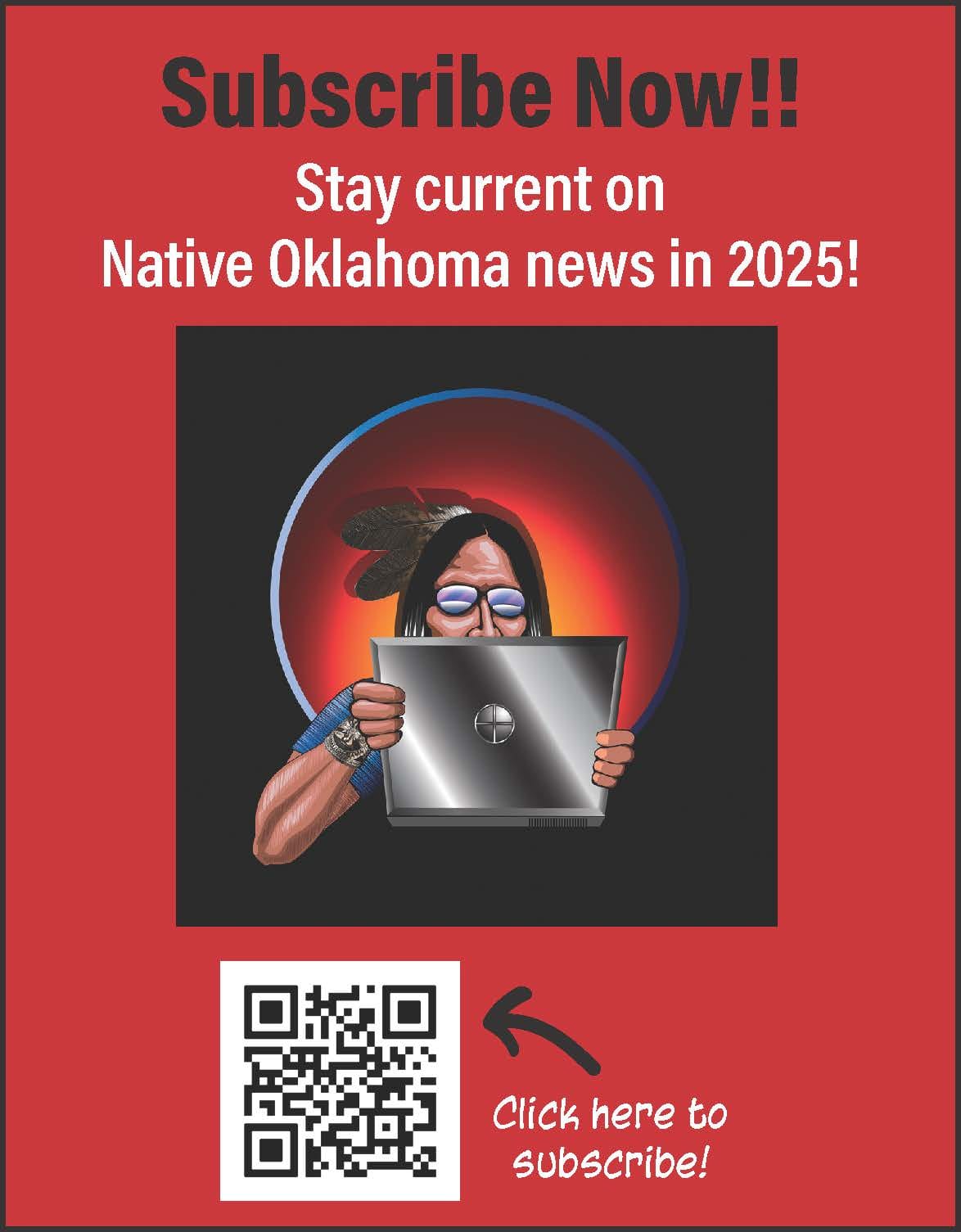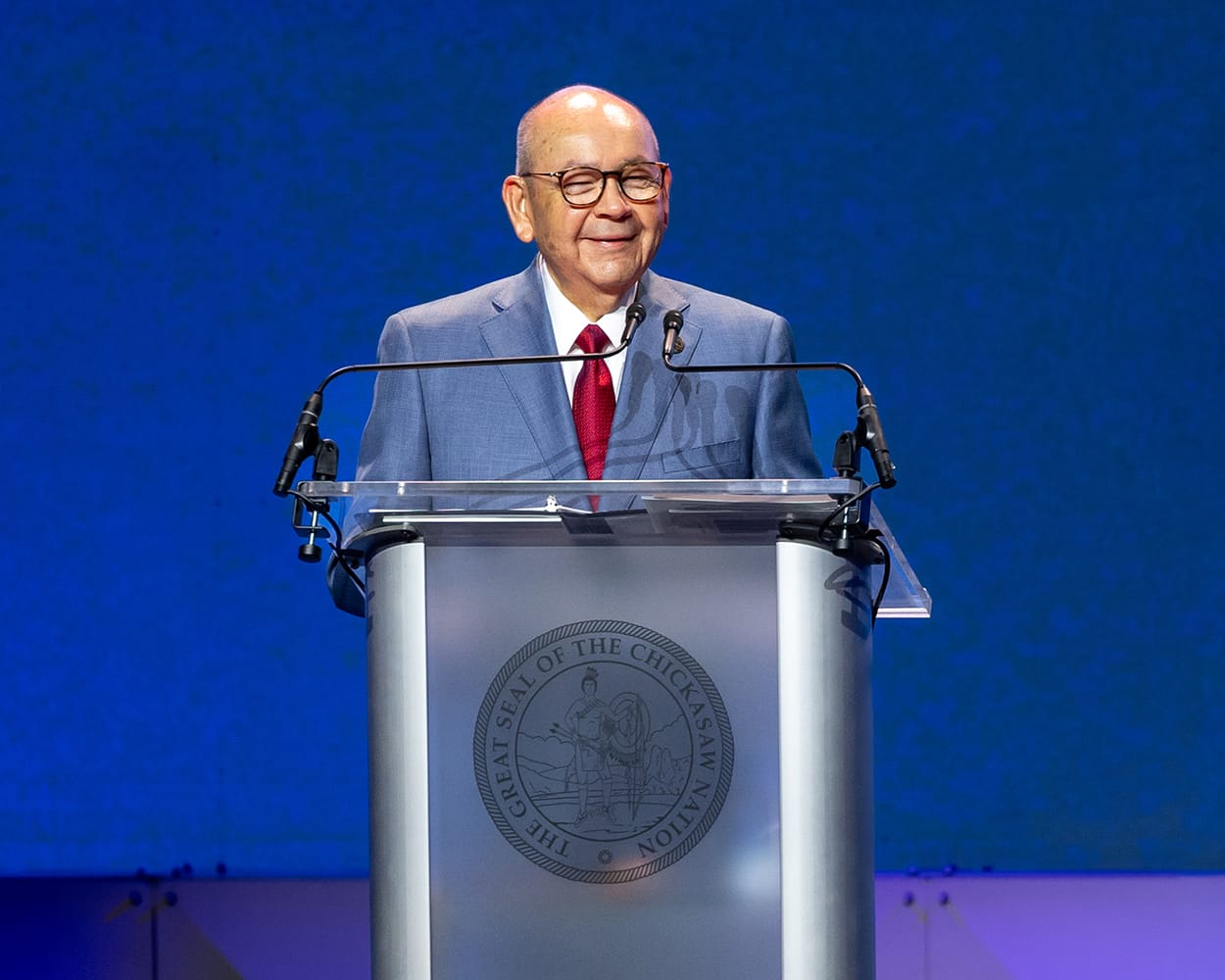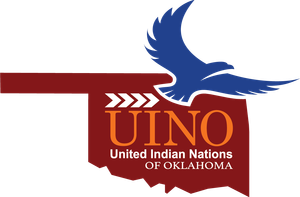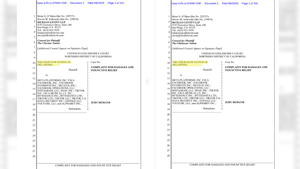

Chickasaw Nation Governor Bill Anoatubby: ‘The best is yet to come.’
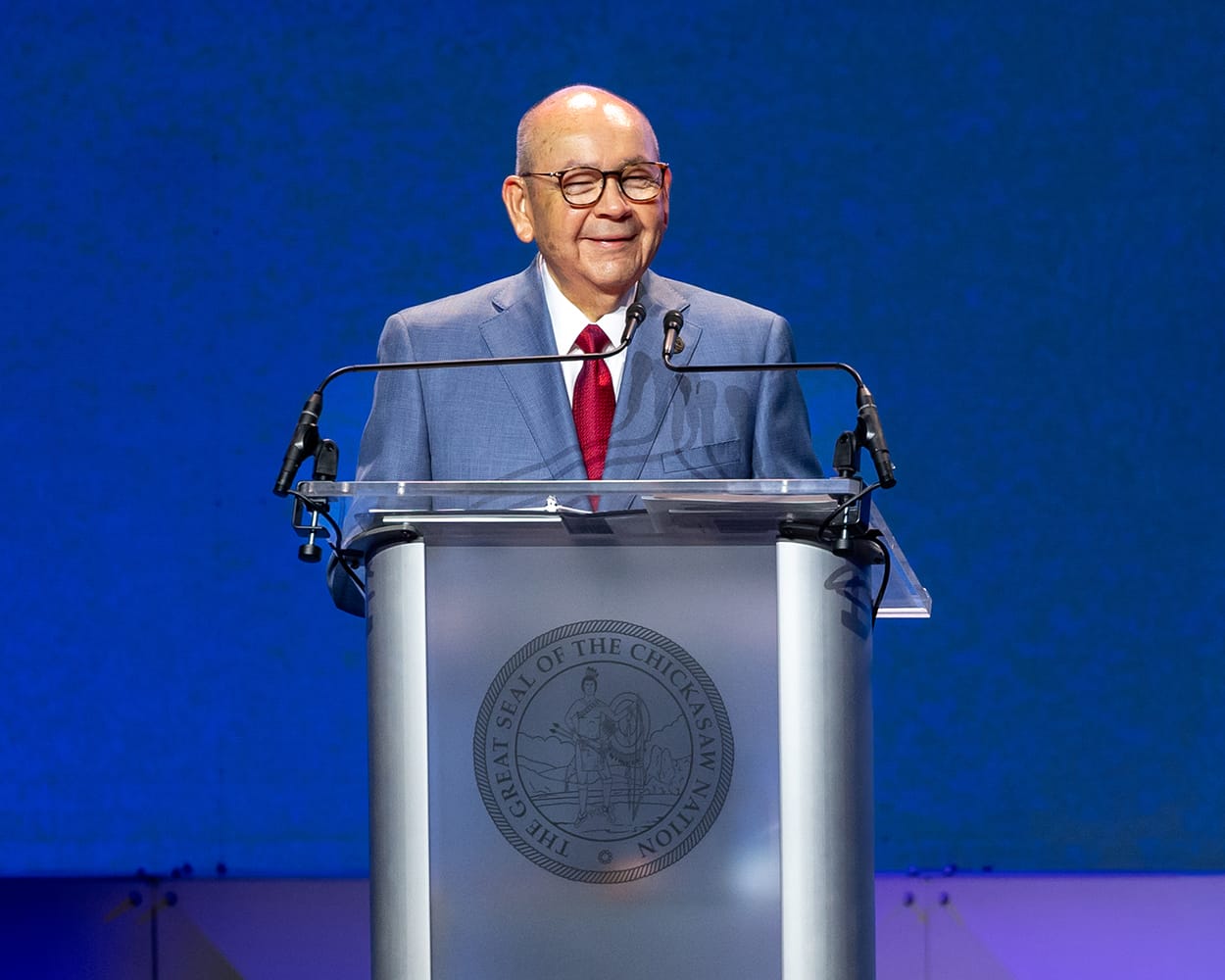
Governor says the state of the Chickasaw Nation is remarkably strong
TISHOMINGO, Okla.— During his Oct. 4 State of the Nation Address, Chickasaw Nation Governor Bill Anoatubby said the preservation of sovereignty and self-determination are the result of a united Chickasaw people committed to a collective future guided by a generational vision.
Governor Anoatubby reported the state of the Chickasaw Nation is strong and the “best is yet to come” during his address at the Aiitafama' Ishto (large meeting place) on the Chickasaw Capitol Building grounds.
“My fellow Chickasaws, I am honored to report to you today, that the state of the Chickasaw Nation is remarkably strong, and the best is yet to come,” Governor Anoatubby said. “We are well positioned to continue to protect and preserve our sovereignty, our culture and traditions, and our nation for many, many generations to come.”
Governor Anoatubby, who is celebrating 50 years of service with the Chickasaw Nation, delivered his remarks during the 65th Chickasaw Annual Meeting.
The modern tradition of Chickasaw Annual Meeting began in 1960, when dozens of Chickasaws met at Seeley Chapel, near Connerville, Oklahoma, to discuss the state of their nation, the dream of reestablishing the Chickasaw government, regaining recognition of tribal sovereignty, and protecting and revitalizing the language and culture.
The Chickasaw Nation, which is more than 82,000 citizens strong, continues to grow stronger through action and exercising sovereign rights.
An important aspect of sovereignty is the responsibility to care for the Chickasaw people by providing opportunities for quality health care, housing, education and more. Also crucial is the responsibility to have a vision for the future and to secure the resourcess necessary to make the vision a reality, Governor Anoatubby said.
“These efforts are all part of an ongoing story of sovereignty and self-determination, of generational vision,” he said.
Business Impact
Diverse businesses, fiscal stewardship, strategic planning and economic development strengthens the Chickasaw Nation’s ability to meet the mission, “to enhance the overall quality of life of the Chickasaw people.”
“The Chickasaw Nation’s financial condition remains very strong,” Governor Anoatubby said. “We are well positioned to bring our vision for the future into fruition.”
This year, the Chickasaw Nation’s businesses continue to succeed through expansion and innovation, said Chickasaw Nation Lt. Governor Chris Anoatubby in his financial report.
Two significant investments opened this year in Oklahoma City: the OKANA Resort and Indoor Waterpark and the new Exhibit C location in the Horizons District. Since opening in February, more than 286,000 guests have visited OKANA.
In 2025, Chickasaw Community Bank acquired Oklahoma Heritage Bank, a well-established community bank serving the Ada, Stratford, Roff and Byng communities, allowing the Chickasaw Nation-owned bank to significantly expand its reach.
In fiscal year 2025, Chickasaw Nation net assets increased more than $460 million over the previous fiscal year and now exceed $7.5 billion.
“We will continue our steadfast commitment to the well-being and service of all Chickasaws and the promising future of the Chickasaw Nation,” Lt. Governor Anoatubby said.
Cultural Preservation
Many significant milestones in efforts to preserve and share Chickasaw culture and history were celebrated this year, including the 60th anniversary of the Chickasaw Council House in Tishomingo, where the 1856 Chickasaw Constitution was created and signed.
The Chickasaw Cultural Center, Sulphur, Oklahoma, recently celebrated 15 years of sharing Chickasaw culture and heritage with visitors from around the world.
Development on the Chickasaw Heritage Center (CHC) in Tupelo, Mississippi, continues to make progress. Located within the Chickasaw Nation’s historic Homeland, the CHC will be the largest and most advanced education experience in northeast Mississippi.
“The heritage center is planning to share the vibrant story of the Chickasaw people, from a Chickasaw perspective, in our historic Homeland,” Governor Anoatubby said. “We look forward to sharing this story with thousands of visitors that will explore our unique Chickasaw culture and expand their understanding.”
Health
The Chickasaw Nation Department of Health had another successful year, with more than 1 million patient encounters, more than 1.5 million prescriptions filled, nearly 1,000 babies born at the Chickasaw Nation Medical Center and more than 36,000 pediatric patient visits logged.
In 2024, the Chickasaw Nation Department of Health was the first health care system in Oklahoma to receive the prestigious Malcolm Baldrige National Performance Award for Quality and Performance Excellence.
“It represents three decades of constant improvement in our health care system and the continuous dedication to reaching new heights of health care excellence,” he said.
Progress and design plans continue for the new Newcastle medical facility. An agreement has been inked with Indian Health Service to build and staff what will be the largest and most comprehensive First American hospital in the United States.
“The hospital will bring world-class care to Chickasaws and First American families in Chickasaw Nation, as well as the Oklahoma City metro area and beyond that,” Governor Anoatubby said.
The Chickasaw Nation’s home health program, Minticha Apila (come and help) Home Health, opened this year, marking a major step forward in delivery of health care services to Chickasaw citizens and First Americans.
For more than 40 years, Chickasaw Nation Nutrition Services has provided essential nutrition through the Food Distribution Program and it remains a priority.
The Chickasaw Nation Summer EBT for Children program provides all qualifying children a monthly benefit for food purchases during the summer months. Through a partnership with Hunger Free Oklahoma, the Chickasaw Nation expanded the Summer EBT program this year, serving more than 100,000 children. The program added more than $12 million into the local economy for food purchases.
“This vital resource ensures children in our state have ample opportunities for nutritious meals regardless of tribal affiliation,” Governor Anoatubby said.
Education
Investing in the education and skill development of all Chickasaws remains a top priority.
This year, the Chickasaw Nation awarded more than 5,000 Chickasaw students approximately $31 million in higher education scholarships and other educational support.
The Chickasaw Nation also offers tutoring assistance, internships, career development, student support services, the Chickasaw Institute of Technology (CIT) and many other educational programs. Career training in construction, electrical, plumbing, HVAC, applied business technology and certified nurse assisting is offered by the CIT, which has graduated 71 students this year.
“Through these resources and support, we are working to assist citizens in reaching their goals and fulfilling their highest potential,” Governor Anoatubby said.
Community Services
Several direct programs and services were enhanced this year, including the assisted living program, down payment and closing cost assistance, and home improvement grants. An elders clothing grant program was launched and served more than 9,400 Chickasaw elders this year. The storm shelter program was rebranded as the homeowner preparedness grant.
“We eliminated the waitlists for the Chickasaw Home Improvement Grants and homeowner preparedness programs and served more than 4,800 Chickasaws,” he said.
The Chickasaw Warrior Society marked its 10th anniversary this year. The Chickasaw Warrior Society promotes a sense of community and camaraderie among Chickasaw veterans. The warrior society has more than 1,800 members across the United States.
Protecting and Serving the Community
The Chickasaw Lighthorse Police Department, Chickasaw Nation court systems and other public safety initiatives continue to expand both in personnel and resources.
“Because of our investments and the work we do as a sovereign government, there are now more resources going to law enforcement and public safety within the Chickasaw Nation boundaries than ever before,” Governor Anoatubby said.
The operating budget of Chickasaw Lighthorse Police Department has more than tripled since 2021 to meet the expansion of jurisdictional responsibilities since a 2020 U.S. Supreme Court decision led to the affirmation that the Chickasaw Nation has criminal jurisdiction throughout the entire 7,648 square miles of the treaty territory. Likewise, the operating budget of Chickasaw Nation Office of Tribal Justice Administration has nearly tripled.
Chickasaw Lighthorse has grown into a force of more than 160 sworn officers with more than 40 support personnel stationed at three precincts.
The Chickasaw Nation Masali: Healing to Wellness Court and Truancy Court offer an alternative approach to costly incarceration for certain crimes. Masali: Healing to Wellness Court brings a holistic approach to support the substance use recovery of First Americans.
Pontotoc County District Attorney (DA) Erik Johnson and the Chickasaw Nation established a Memorandum of Understanding (MOU) to help prioritize and ensure proper jurisdiction for prosecuting charges that come before them.
The Chickasaw Nation currently has more than 80 cross-deputization agreements with partnering law enforcement agencies.
Chickasaw Nation Emergency Management maintains partnerships with key federal, state and municipal agencies, and the Chickasaw Nation Geographic Information Systems (GIS) team provides data to first responders and partner agencies.
Governor Anoatubby said the mutually beneficial agreements are proactive steps to protect the safety and security of the community.
“These and other public safety partnerships serve to better protect everyone in communities across Oklahoma,” he said.
A Sovereign Future
Governor Anoatubby emphasized that the Chickasaw Nation's commitment to language and culture preservation, health care, education and many other vital services is a modern expression of the work to maintain sovereignty and self-determination, and represents a generational vision of a living nation.
“As we move forward, realize that we are all part of a living nation – one that grows stronger through action and the exercising of our sovereignty and our responsibilities. This is what it means to be a tribe, a nation – a people connected by family, by culture and through our collective past and future. This is what it means to be Chickasaw,” he said.

Federal government shuts down with no end in sight
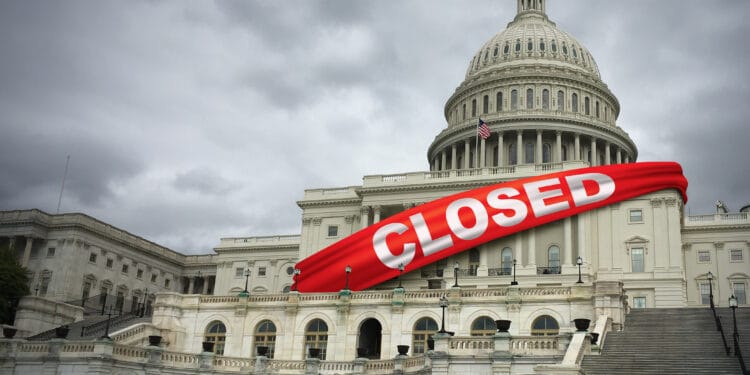
by Braden Harper, Mvskoke Media
WASHINGTON – On Wednesday, Oct 1, the federal government shutdown. As of Oct. 7, the Senate failed to pass five stopgap funding bills, temporary spending bills that would allow federal government operations to continue when final appropriations have not been approved by Congress and the President. The shutdown came after an extension for healthcare tax credit subsidies failed to pass in Congress. The tax credits, originally put in place in 2021 during the Covid-19 Pandemic, are now set to expire. This marks the first government shutdown for the current Trump administration, and the third under his leadership. When a government shutdown occurs, it affects the Tribal nations, particularly smaller Tribes, that rely on federal funding to provide services for their citizens.
According to Muscogee (Creek) Nation Press Secretary Jason Salsman, the government shutdown will have minimal effect on Tribal services offered by the Nation.
“We’re confident in all of our Tribal systems. We’ve been through these instances before,” Salsman said. “We feel that we’re in a good position and are prepared to be able to handle any interruptions in service. And we believe that those in Washington D.C. will figure this out sooner than later. But in the meantime, we have a one hundred percent self sustainable health system and many of our programs will be able to get by at this time. So we’re staying in close connection with our Washington D.C. lobbyists and our folks in Washington, but we’re also staying with regular meetings with different areas of finance and federal programs to make sure that there’s limited interruption.”
Cherokee Nation Principal Chief Chuck Hoskin Jr. released a public statement on the shutdown. Just like MCN, the Cherokee Nation health system will not be affected by the shut down. He called for federal leaders to come together to find a solution. The statement reads:
The Cherokee Nation maintains sufficient financial stability to navigate the immediate impacts of a federal government shutdown, but we’re hopeful that Congress’ foresight to provide an advance appropriation for the Indian Health Service will prevent any severe disruptions as experienced during the 2013 and 2018 shutdowns. I urge both sides of the aisle to work on a path forward and reopen the government as soon as possible and call on the administration to honor the government’s Treaty and Trust responsibilities, avoid needless cuts to Tribal programs and personnel, and use its authorities to minimize harm to tribes and tribal citizens.
According to the National Congress of American Indians, Indian Health Services will not be affected by the government shutdown. However, smaller tribes could see effects in their programs and services. According to Cedar Rock Alliance Vice President of Intergovernmental Affairs Liz Carr (Sault Ste. Marie Tribe of Chippewa Indians), a shutdown is in violation of treaties.
“Our intention is to remind those in power that Indian Country can’t afford a shutdown.” Carr said. “Shutting down is an abdication of the trust and treaty responsibilities. If they do shut down they need to take prompt action to protect Indian Country.”
The Associated Press reported that Medicare and Medicaid are expected to continue offering services, however delays may be expected for some services. According to comments made from National Economic Council Director Kevin Hassett on CNN, federal employees now face furloughs and firings. Senator Mike Rounds (R- South Dakota) appeared on PBS News Hour to discuss how to avoid disruptions to services and possible furloughs moving forward. His answer is to simply open up the government again.
“There really is no other way to start than starting government and opening it up again,” Rounds said. “And that’s part of the message that we’re trying to share is, there’s lots of ways using regular order, the traditional way in which we do appropriations and everything, to accomplish a lot of really good things in the Senate.”
Oklahoma Senator James Lankford appeared on KOKI Fox 23 to explain the holdup in Congress. According to Lankford, the core issue is over a proposed seven-week stopgap funding bill. The government is still determining which federal positions are essential and non essential, or which jobs can and can not be worked remotely. Those working positions that are deemed non essential may lose their jobs altogether. Lankford also said those seeking certain government services will find offices empty.
“Some people are trying to get a permit, do oil and gas development, reach out to a National Park area or other certain offices. They will suddenly find the person they were going to call is now on furlough, they’re not there. They can’t issue that permit during a government shutdown,” Lankford said.
Coincidentally on Oct. 1 the Claremore Indian Hospital officially celebrated its transfer of ownership to the Cherokee Nation after a negotiation process that lasted over a year. According to Cherokee Nation, patients will not see a disruption of service due to the transfer or the shutdown. Likewise the Indian Health Care Resource Center in Tulsa announced the shutdown will have no effect on their services to tribal citizens.
Government shutdowns can vary in length. The Obama administration saw one government shutdown that lasted 16 days in 2013. The Trump administration saw two government shutdowns in 2018, the first lasting two days, the second lasting 34.
“Government shutdowns are kind of like a war. It’s easy to start, it’s hard to stop. Once you shut the government down you don’t know how long it takes.” Lankford said.
The next Senate vote on a stopgap funding bill will be on Monday, Oct. 6. The Senate met to convene at 3 p.m. (ET) but there are no reports of a vote result yet.

Cherokee Nation takes over Claremont Hospital, authorizes $255M for upgrades, replacement facility
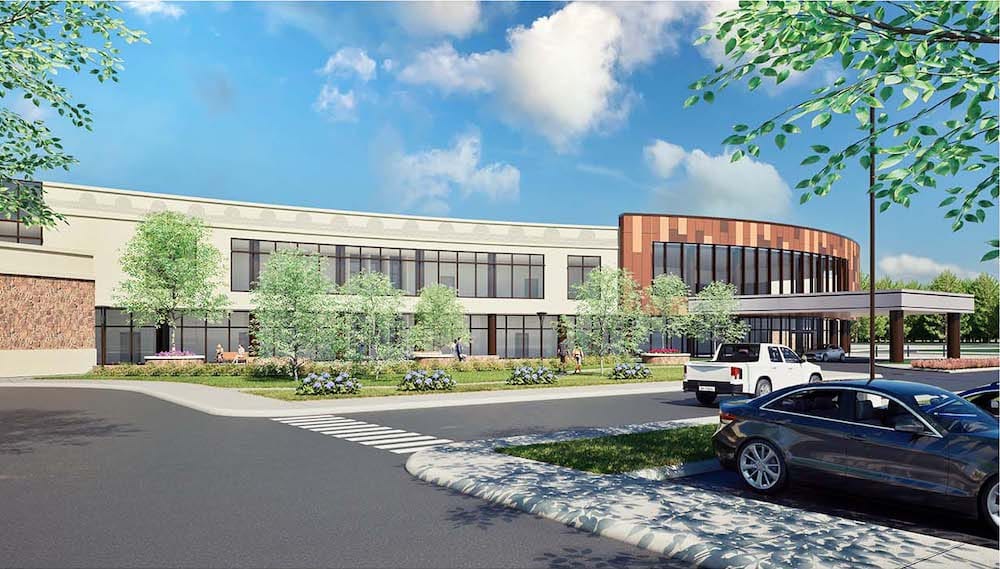
by Tribal Business News
Cherokee Nation leaders and community members gathered Wednesday as the tribe officially assumed operations of the former Claremore Indian Hospital, the last federally run Indian Health Service facility within the Cherokee Nation Reservation.
The Claremore Outpatient and Emergency Health Center will now be part of Cherokee Nation’s health system, which delivers more than 2 million patient visits annually across 11 facilities, according to a news release from the tribe.
“After decades of federal underfunding and neglect, we are taking responsibility for delivering the care our people deserve,” Principal Chief Chuck Hoskin Jr. said in a statement. “This is what self-determination looks like in action.”
The takeover was approved Sept. 23 by the U.S. Department of Health and Human Services, leaving Lawton Indian Hospital in southwest Oklahoma as the last remaining federally operated Native hospital in the state.
The tribe has authorized $255.5 million for the transition, including $11 million in immediate upgrades and $244 million for a replacement facility scheduled to open in 2027, according to the release.
The new facility will include an expanded emergency department, wellness center and outpatient services. Cherokee Nation has also partnered with Hillcrest Hospital Claremore to provide labor and delivery care.
About 80% of Claremore Indian Hospital employees who reapplied were offered positions under Cherokee Nation.
The tribe operates the largest tribal health system in the country, and the Claremore transfer is part of a broader expansion of Cherokee health services across the tribe's northeast Oklahoma reservation.
In early 2026, Cherokee Nation will open the new six-story, $470 million W.W. Hastings Hospital in Tahlequah. The existing W.W. Hastings Hospital, which opened in 1936, currently has 56 beds. The new facility will have 127 beds. The tribe also recently opened the $85 million Amo Health Center in Salina in August.
Cherokee Nation is also investing $73 million in behavioral health improvements, including an adult residential treatment center in Tahlequah.
In his State of the Nation Address in late August, Hoskin said the effort to expand healthcare is a matter of sovereignty and separating a crucial societal need from federal volatility.
“We can throw up our hands, or we can roll up our sleeves,” Hoskin said. “The Cherokee people expect the leaders of this government to roll up our sleeves, maintain our priorities and hold the federal government accountable.”
